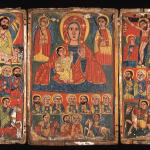Aboard the papal plane, Nov 1, 2016 / 11:43 am (CNA/EWTN News).- During his flight from Sweden to Rome on Tuesday, Pope Francis gave a press conference to the journalists assembled aboard the papal plane. He reflected on refugees, the ordination of women, ecumenism, and the crisis in Venezuela. He also addressed secularization, human trafficking, and his possible international trips in the coming year. Please find below the full text of the Nov. 1 press conference, translated by Catholic News Agency: Greg Burke: Thank you, Holy Father. Welcome. We have… you spoke a lot of walking together, this when we speak of different religions…. We also have walked a bit of a path together, some for the first time. We have Swedish journalists. I think that it’s been a bit of time that Swedes haven’t come. Let’s begin with them. Elen Swedenmark, from the Swedish Agency, TT.Pope Francis: Above all, I’d like to greet you and thank you for the work you’ve done and the cold you’ve taken on, but we left in time because they say that this evening it will go down another five degrees. We got out in time. Thanks so much… thanks for the company and for your work.Ellen Svedenmark: Thanks. Hello. Yesterday, Holy Father, you spoke of the revolution of tenderness and at the same time, we see ever more people from nations like Syria or Iraq are seeking refuge in European nations but some react with fear or there are even people who think that the arrival of these refugees might threaten the culture of Christianity and Europe. What is the message for the people who fear this development of the situation? And what is your message to Sweden, which after a long tradition of receiving refugees is now beginning to close its borders?Pope Francis: First of all, I as an Argentine and a South American thank Sweden so much for this hospitality ... because so many Argentines, Chileans, Uruguayans, in the time of the military dictatorships were welcomed in Sweden. Sweden has a long tradition of welcoming ... not only receiving, but integrating, immediately seeking a home, school, work, integrating a people. I’ve been given the statistic, maybe I’m wrong, I’m not sure… what I remember, but I could be wrong…how many inhabitants does Sweden have? 9 million…of these 9 million, they’ve told me…850,000 would be the “new Swedes,” that is, immigrants or refugees and their children. This is the first. Secondly, one must distinguish between migrant and refugee. The migrant must be treated with certain rules, because to emigrate is a right, but it is a very regulated right. On the other hand, being a refugee, one comes from a situation of war, of anguish, of hunger… from a terrible situation. And the status of the refugee needs more care, more work… and also in this, Sweden has always provided an example in settling, in teaching the language and the culture, also integrating into the culture. In this (issue) of integration of culture, we shouldn’t be afraid, eh! Because Europe was made with a continuous integration of culture, so many cultures, no? I believe that - I don’t say this in an offensive way, no no no, (but) as a curiosity - the fact that today in Iceland, practically in the Icelandic language of today, they can read their classics from 1,000 years ago without difficulty means that it is a nation with little migration or few waves, as Europe has had. Europe was made from migrations and…Then, what do I think of the countries that close their borders? I think that theoretically, one cannot close their heart to a refugee. But also the prudence of those who administrate must be very open to receiving them, but also to making calculations as to how to settle them, because not only must a refugee be received, but he must be integrated. And, if a country has a “living capacity” - let’s call it that - of integration, but do it up to that limit…and if there’s anything more? Do more! But always with an open heart, it’s not human to close doors! It’s not human to close the heart! And on the long term, one pays for this. Here, we pay politically, no? Just as also one can pay politically for an imprudence in calculations, in receiving more of those who can be integrated… because what is the danger when a refugee, a migrant (this counts for both of them) isn’t integrated, is not integrated, (when) - I permit myself the word, it’s perhaps a neologism - one is “ghettoed,” enters into a ghetto. It’s a culture that doesn’t develop in relationship with the other culture. This is dangerous. I think that the worst counselor for the countries that tend to close their borders is fear. And the best counselor is prudence. I spoke with an official of the Swedish government in these days and they told me of some difficulties in this moment - and this goes for your last question - some difficulties because so many come that there isn’t time to sort them out and find school, home, work, learn the language. Prudence must do something. But, Sweden… I don’t believe that Sweden is, if it diminishes its capacity to welcome, may it do it for egoism because it has lost that capacity. If there is something of the sort, it’s for the latter that I said: that so many today look to Sweden because they know how to welcome, but there isn’t the necessary time to sort out everyone. I don’t know if I answered.Greg Burke: Thank you, Holy Father. Now, a question from the Swedish nation, in the same row, Christina Kaplan.Christina Kaplan: Good morning. The Sweden that hosted this important ecumenical encounter has a woman as head of it’s own Church. What do you think: is it realistic to think of women priests also in the Catholic Church in the coming decades? And if not, why are Catholic priests afraid of competition?Pope Francis: Reading the history a bit in the area where we were, I saw that there was a queen who was widowed three times. And I said: but, this woman is strong, and they told me: Swedish women are very strong, very good. And because of this some Swedish man looks for a woman from another nationality...I don’t know if it’s true, but...on the ordination of women in the Catholic Church, the final word is clear, it was said by St. John Paul II and this remains. On competition, I don’t know... Cristina Kaplan: (inaudible)Pope Francis: If we read well the declaration made by St. John Paul II, it goes along this line, yes.Greg Burke: Thank you, Holy Father.Pope Francis: But women can do so many things better than men, even in the dogmatic field: to clarify, to perhaps give some clarity, not to say only a reference to a document. In Catholic ecclesiology there are two dimensions to think about. The Petrine dimension, which is from the Apostle Peter, and the Apostolic College, which is the pastoral activity of the bishops, as well as the Marian dimension, which is the feminine dimension of the Church, and this I have said more than one. I ask myself: who is most important in theology and in the mystic of the Church: the apostles or Mary on the day of Pentecost? It's Mary! ...the Church is a woman! It's "la Chiesa" (in Italian), not "il Chiesa"...it's "la Chiesa" and the Church is the spouse of Christ. It's a spousal mystery. And in light of this mystery you will understand the reason for these two dimensions. The Petrine dimension, which is the bishops, and the Marian dimension, which is the maternity of the Church...but in the most profound sense. A Church doesn't exist without this feminine dimension, because she herself is feminine.Austen Ivereigh, Crux: Thank you very much, Holy Father this fall has been very rich in ecumenical encounters with the traditional churches; the Orthodox, the Anglican and now the Lutheran, but the majority of Protestants in the world today are from the Evangelical, Pentecostal, tradition. I have understood that on the vigil of Pentecost this coming year, there will be an event in Circus Maximus celebrating the 50th anniversary of the Charismatic Renewal. You have had many initiatives, perhaps for the first time as Pope with the evangelical leaders. What do you think of these initiatives, and what do you hope to achieve from the meeting next year? Thank you.Pope Francis: With these initiatives, I would say that I had two, two types of initiatives, one when I went to Caserta to the charismatic church and also along this same line when in Turin I went to the Waldensian church. An initiative of reparation and of forgiveness because Catholics, part of the Catholic Church, didn't behave well with them and had to apologize and heal a wound. The other initiative was dialogue, already since Buenos Aires. In Buenos Aires for example we had three encounters in the Luna Park in Buenos Aires that had the capacity for 7,000 people, three encounters of evangelical and Catholic faithful in the line of the charismatic renewal, but also open. And the encounter was for the whole day. A pastor and an evangelical bishop preached and a Catholic priest and a Catholic bishop preached, or two and two, they were varied. In two of these encounters, if not in all three, but in two for sure, Fr. Cantalamessa, Preacher for the Papal Household spoke. The thing already comes from previous Popes since I was in Buenos Aires and it did us well, and we also had two three-day spiritual retreats of pastors and priests together. Pastors and priests, and a bishop, preached together and this helped a lot with dialogue, understanding the approach [to each other], to work and above all to work with the most needy together and to respect, great respect. These are with respect to the initiatives which come from Buenos Aires and already here in Rome, I have had some meetings with two pastors, with three already, some who come from the United States and from here in Europe, and what you mentioned is the celebration organized by the ICCRS, the celebration of the 50th anniversary of the charismatic renewal, which was born ecumenical and for this reason it will be ecumenical in that sense and it will be at Circus Maximus. I have planned, if God gives me life to go, to give a talk there. I think that it will last for two days, but it is still not organized. I know that they are going to do the vigil of Pentecost and I am going to give a talk in that moment. With respect to the charismatic renewal and with respect to the pentecostals, the word pentecostal, the pentecostal renewal: today, it is confused because it mentions many things, many associations and many ecclesial communities that aren't equal, they are even opposite, so we need to specify further. They have been universalized so much that it is a misleading term. In Brazil, it's typical, the charismatic renewal has proliferated a lot. It was born and one of the first opponents that it had in Argentina is what you were speaking about, because I was provincial of the Jesuits at the time when this began, and I forbid the Jesuits to get involved in it and I publicly said that when they were going to have a liturgical celebration, it had to be a liturgical celebration and not a school of Samba. I said this. And, today, I think the opposite when it is well done, more so in Buenos Aires. Every year, once per year, we had Mass of the ovement of the charismatic renewal in the cathedral where everyone came, and I also suffered a process of recognizing the good that the renewal had given to the Church and here we cannot forget the great figure of Cardinal Suenens, who had that prophetic and ecumenical vision.Greg Burke: Thank you, Holy Father. And now Eva Fernandez from COPE, the Spanish radio.Eva Fernandez: You recently met with Nicolás Maduro, president of Venezuela. What sensation did this meeting give you, and what is your opinion on the beginning of the conversations?Pope Francis: The president of Venezuela asked for an interview, and appointment because he came from the Middle East, from Qatar, the Emirates, and he made a technical stop in Rome. He asked for an interview first, he came in 2013, then he asked for another appointment, but he got sick and couldn’t come, and then he asked for this meeting. If the president asks, I receive him. What’s more, he was in Rome for a stop. I listened to him for half an hour, an appointment, I listened, I asked him some questions and I heard his opinion. It’s always good to listen to all areas, no? I listened to his opinion. In reference to the second, dialogue. It’s the only path for all conflicts, eh...for all conflicts...there is no other. I with my heart put it on dialogue, and I believe that one must go forward on this path. I don’t know how it will end, I don’t know because it’s very complex...but the people who are in dialogue have important political stature...Zapatero, who was twice president of the Spanish government...and the other, Restrepo… (Editor’s note: he probably refers to Martin Erasto Torrijos Espino, another mediator for the Venezuelan crisis) asked the Holy See to be present in the dialogue, on both sides. And the Holy See assigned the nuncio to Argentina, Archbishop Celli, who I think is on the flight of the negotiations. But dialogue that favors negotiation is the only path to go out of conflicts. There is no other. If this had been done in the Middle East, how many lives would have been spared.Mathilde Imberti: Holiness, we’re returning from Sweden, where secularization is very strong… it’s a phenomenon that touches Europe in general. In a country like France, they even estimate that in the coming years, a majority of citizens will be without religion. In your view, is secularization fate? Who are those responsible? Lay governments or the Church that might be too timid?Pope Francis: Fate, no. I don’t believe in fate. Who is responsible? I wouldn’t know how to say, “You are responsible.” I don’t know. It is a process of… but before this, I’d like to say something: Pope Benedict XVI spoke of this a lot and clearly, and when the faith becomes tepid it’s because, as you say, the Church is weakened… the most secularized times… but let’s think to France: the times of the “worldliness” of the court, the times when the priests were the abbots of the court… it’s a clerical functionalism… the strength of evangelization was lacking, the strength of the Gospel. Whenever there is secularization, we can say that there is something of weakness in the evangelization, a big one. It really is. But, there is another process, a cultural process, a process of - I think that I spoke of it once - of the second form of “inculturation,” when man receives the world from God and to make culture, to make it grow, dominate it… at a certain point man feels such an owner of that culture, let’s think to the myth of the Tower of Babel, such an owner of that culture that he begins to make himself the creator of another culture, but his own, and occupies the place of God the Creator, no? And in secularization, I believe that sooner or later one arrives to the sin against God the Creator. It is sufficient… it’s not a problem of secularism , because you need a healthy secularism , the autonomy of things, the healthy autonomy of things, the healthy autonomy of the sciences, of thought, of politics, a healthy secularism is needed. Another thing is a laicism like what illuminism left us in inheritance, no? I think that there are these two things: a little the self-importance of the man creator of culture, but who goes beyond the limits and feels himself God is also a weakness in evangelization, it becomes tepid, and Christians are tepid, no? There, it’s saves us a bit to take up again the healthy autonomy of the development of culture and the sciences also with the dependence of being a creature, not God, no? And also taking up again the strength of evangelization. Today, I think that this secularization is very strong in certain cultures and also very strong in different forms of worldliness. Spiritual worldliness. When it enters into the Church, spiritual worldliness is the worst. They are not my words, this that I say now, they are words of Cardinal de Lubac, one of the great theologians of the Council, eh! He says that when spiritual worldliness enters into the Church - this is a way - it is the worst that can happen to it, even worse than that which happened in the age of the corrupt Popes. And he says some forms of corruption of the Pope, I don’t remember well, but so many, eh… worldliness… and this is dangerous… and I’m risking that this sound like a sermon, but it is … a homily… but I’ll say this: Jesus when he prays for all of us in the Last Supper, he asks one thing for all of us to the Father, of not taking us from the world, but defending us from the world of worldliness. [Worldliness] is extremely dangerous. It is a secularization with a bit of make-up, a bit disguised, a bit ‘pret-a-porter’ in the life of the Church I don’t know if I’ve answered something of…Greg Burke: Thank you, Holiness. Now from the German television, ZDF, Jurgen Erbacher and we are at 35 minutes, one more…Pope Francis: Yes, for them, for lunch…Jurgen Erbacher, ZDF: Holiness, a few days ago you met with the Santa Martha Group that works in the fight against modern slavery and human trafficking, topics that I think are very close to your heart… but not only as Pope, but already in Buenos Aires you took up these topics. Why? Is there a special or possibly also personal experience [behind it]? And then as a German at the beginning of the year of commemoration of the Reformation, I must also ask if you are coming to that country where the Reformation began 500 years ago, perhaps during this year… Pope Francis: I’ll begin with the second: the schedule of trips for next year isn’t finished, yes, we’re only almost sure that I will go to India and Bangladesh, but that isn’t done, it’s a hypothesis. I continue to the first question. Yes, I, from my time in Buenos Aires, but since I was a priest, have always had this restlessness of the flesh of Christ, no? The fact that Christ continues to suffer and Christ is crucified continuously in his weakest brothers…it has always moved me! I worked as a priest, little things with the poor, but not exclusively, I also worked with university students and… then as bishop of Buenos Aires, we also (worked) together with non-Catholic and non-believing groups against slave labor, especially Latin American migrants who arrive in Argentina, they take their passport and make them do slave labor in the industries, but closed up (inside). But once one burned down and they had the children on the rooftop, all dead, and also someone from there who wasn’t able to escape. Truly slaves, slaves...this moved me! The trafficking of persons...and I even worked with two congregations of sisters who were working with prostitutes, or, women enslaved in prostitution...I don’t like to say ‘prostitutes’...slaves of prostitution! Then once a year all these slaves of the system had a Mass in Constitution Square, which is one of the terminals, one of the railways, like Termini, I think of Termini...and they had a Mass there with everyone and to this Mass came all the organizations, the sisters who worked and even groups of non-believers but who worked together. And here you work the same. But here in Italy there are many volunteer groups who work against every form of slavery, whether it’s work, women...some months ago I visited one of these organizations and the people...Here in Italy they do well in volunteer work, I never thought that it happened like this. It's a beautiful thing that Italy has, no? Volunteer work is due to pastors or parish priests...the oratory and volunteering are two things that were born from the apostolic zeal of Italian parish priest. But I don't know if I have responded…Maybe I don’t know well how...Greg Burke: Thank you, Holiness. They say that if we want to eat we must go...this is what my boss says.Pope Francis: I thank you again for the questions, thank you very much! Thanks a lot and pray for me! Have a good lunch! Read more
















